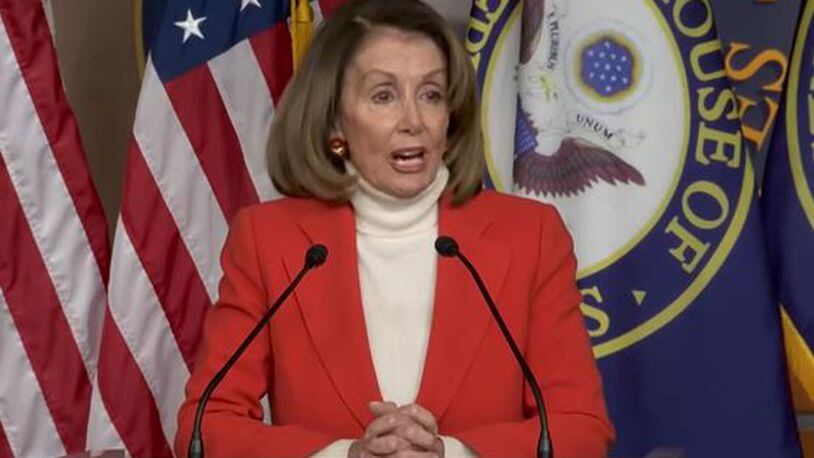Despite weeks of grumbling, no other Democrat stepped forward to challenge Pelosi, but she still faces another vote where opposition from her own party could derail her bid to become Speaker.
"The vast majority of the caucus enthusiastically supports Nancy Pelosi," said Rep. Jim McGovern (D-MA), who is in line to become chairman of the powerful House Rules Committee, as the final vote was 203-32.
Still a question is what will happen in January when the new Congress convenes, as Pelosi will still need the votes of a majority of members - 218 if all are present and voting - in order to become Speaker, as some Democrats continue to say they will vote against her.
"Are there dissenters? Yes," Pelosi told reporters, as she said she was in 'pretty good shape' for the January vote.
At this point, Democrats could have 235 members - which would allow Pelosi to lose as many as 17 votes, and still win election as Speaker of the House.
Pelosi served as Speaker between the 2006 and 2010 elections, when Democrats controlled the Congress for four years. She would replace House Speaker Paul Ryan (R-WI), and would be the first person to resume that leadership post since Speaker Sam Rayburn went from Speaker to the minority and back to being Speaker in the mid-1950's.
To get there, Pelosi will need to convince some of those who did not support her in the Democratic Caucus to cast a vote for her on January 3.
"Nancy Pelosi has my enthusiastic support for Speaker," said Rep. Tom Suozzi (D-NY), one of a number of lawmakers who had pressed for rules changes in the new Congress.
Pelosi and her team also worked hard over the last few weeks to bring on board many Democrats who were elected earlier this month, to short circuit an effort to push her from the top spot among House Democrats.
"Based on our conversations and her commitment to prioritize issues critically important to the district, I have decided to support Leader Nancy Pelosi for Speaker of the House," said Rep.-Elect Antonio Delgado (D-NY).
Pelosi was nominated by Rep. Joe Kennedy III (D-MA), who was followed by eight other Democratic lawmakers in giving their public support, including Rep. John Lewis (D-GA) and three newly-elected Democrats from California, Minnesota, and Texas.
"When you have a country in crisis you want Nancy Pelosi at he negotiating table," said Rep. Steve Cohen (D-TN), who compared Pelosi to baseball great Sandy Koufax and basketball star LeBron James.
Just before Democrats voted, Pelosi released details of proposed rules changes in the House which she would support, in order to give members - of both parties - more of a chance to push legislation to the House floor, part of her effort to sew up support from more House Democrats.
+ A new "Consensus Calendar" for bills which have more than 290 co-sponsors. Once that 290 level is reached, 'a 25 legislative day clock will begin,' which then will lead to a House floor vote on that bill.
+ Bipartisan amendments on bills would be given extra consideration for votes on the House floor, if those plans comply with the rules and have at least 20 members from each party as a co-sponsor.
+ Update the discharge petition process, to more quickly start work on bills which gain 218 signatures for action.
"These commonsense reforms will help Congress deliver real results for the American people on their most important priorities that have been bottled up in Congress for too long," read a statement from a group known as the "Problem Solvers," which had pressed for rules changes in the House to spur more bipartisan legislative action.
"This November, voters not only asked for a new party at the helm, but asked for their core issues – health care, immigration, and infrastructure – to get solved," the group added, giving even more fuel to Pelosi's bid for Speaker.
About the Author
